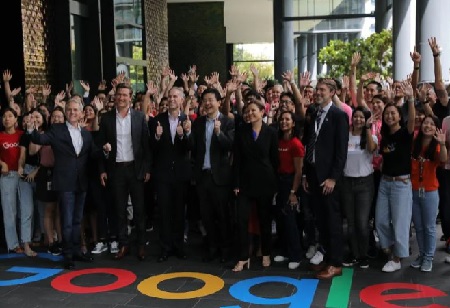
Google begins third data centre, deepens commitment in Singapore after 15 years

 Google has completed its third data centre in Singapore, bringing its total investments in such facilities here to US$850 million (S$1.19 billion).
Google has completed its third data centre in Singapore, bringing its total investments in such facilities here to US$850 million (S$1.19 billion).
Officially launched on Tuesday (Aug 23), the facility in its Asia-Pacific headquarters is meant to support the reliable access of Google services by 2.5 billion people in the region.
The tech giant is also deepening its commitment to Singapore after spending 15 years here, with the launch of a slew of initiatives from a programme to train 50,000 parents and children on online safety to a partnership to broaden the use of artificial intelligence (AI) tools in finance, sustainability and healthcare.
At the launch, Deputy Prime Minister and Minister for Finance Lawrence Wong said that Singapore is well placed to capture the opportunities created by South-East Asia's fast-growing digital economy and will enhance its role as a hub for trade, people and talent flow to achieve that.
Having critical digital connections and technology is key.
"That is why we are making investments in critical infrastructure," said Wong, noting that the Republic's digital partnership agreements with various countries will contribute towards its goal.
Working with tech giants such as Google will also strengthen Singapore's tech ecosystem especially in the areas of skills, innovation and sustainability, he added.
While the specifications of the new data facility were not disclosed, a 2018 report by The Straits Times said it was to be built on a plot of land the size of the first and second centres combined. Its first facility reportedly spans 2.5ha, while the second occupies more than 2ha of land. All three data centres are located in Jurong West.
An Oxford Economics report commissioned by Google found that the American firm's data centres in Singapore have generated US$216 million worth of economic activity in 2020.
"The commitments we are making today, including the completion of our third data centre facility, reflect our confidence in Singapore's technology leadership for the region and the world," said Scott Beaumont, president, Google Asia-Pacific.
Google started data operations here with its first data centre in 2014 driven by demand for mobile Internet data. A second centre came online in 2015.
From a small office at Collyer Quay in Raffles Place with only 24 people in 2007, Google's workforce has now grown to about 3,000 people located at Mapletree Business City II in Pasir Panjang.
To deepen its commitment here, Google has pledged to train 50,000 parents and children in online safety in the next 12 months, working with the Infocomm Media Development Authority (IMDA) and Media Literacy Council.
Wong said there is a need for guard rails to manage the downsides of technology, including increased exposure to fake news, misinformation, online falsehoods and online harms.
For starters, a roving installation of interactive booths, dubbed Google Online Safety Park, will go to selected primary schools starting with CHIJ (Katong) Primary and West Grove Primary School. Google will also share its resources with educators from its Be Internet Awesome curriculum, which teaches children about online safety.
This year, Google will continue with its existing Skills Ignition SG (SISG) programme by providing full-time training in digital marketing or professional cloud architecture over 12 months to 60 applicants.
More than 5,500 people have learnt new skills including data analytics and digital product design since the on-the-job SISG programme was launched in 2020.
Google said that three in four graduates from the July and October 2021 cohorts have found jobs within six months of graduation.
AI solutions for the finance and healthcare sectors and to support sustainability efforts are also in the works, following the signing of a memorandum of understanding between Google and the Smart Nation and Digital Government Group on Tuesday. It is the first technology firm to partner the Singapore Government for such efforts.
Specifically, Google will provide dedicated resources to improve the machine-learning proficiency of selected public sector officers and help shape ethical guidelines related to AI use.
"We are excited about what's next for our partnership. There are so many opportunities ahead, and we look forward to harnessing them together," said Sundar Pichai, chief executive of Alphabet and its subsidiary Google, in a recorded message played during the launch event.

